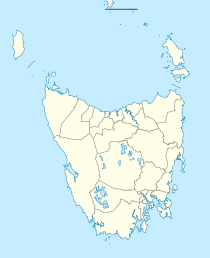Tunbridge, Tasmania facts for kids
Quick facts for kids TunbridgeTasmania |
|||||||||||||||
|---|---|---|---|---|---|---|---|---|---|---|---|---|---|---|---|
| Population | 145 (2016 census) | ||||||||||||||
| Postcode(s) | 7120 | ||||||||||||||
| Location | 24 km (15 mi) N of Oatlands | ||||||||||||||
| LGA(s) |
|
||||||||||||||
| Region | Central | ||||||||||||||
| State electorate(s) | Lyons | ||||||||||||||
| Federal Division(s) | Lyons | ||||||||||||||
|
|||||||||||||||
Tunbridge is a small country area in Tasmania, Australia. It's located in two local government areas: Northern Midlands and Southern Midlands. Tunbridge is about 24 kilometers north of Oatlands. In 2016, about 145 people lived here.
Contents
A Look Back at Tunbridge's History
Tunbridge started as an important stop for coaches. These coaches traveled between Hobart and Launceston. This route is now called the Midland Highway. The town got its name from one of its first inns, the Tunbridge Wells. This inn was named after a place in England called Tunbridge Wells.
Coaching Inns and Their Stories
When coaching was popular, Tunbridge had three main inns. These were the Tunbridge Wells Inn, the Victoria Inn, and the York Inn. Each inn worked with a different coaching company. The Tunbridge Wells Inn served J. E. Cox Coaches. The Victoria Inn was for Samuel Page Coaches. And the York Inn worked with Alfred Burbury Coaches. The Tunbridge Post Office opened in 1856. Tunbridge officially became a locality in 1974.
Tunbridge's Geography
The Blackman River flows through Tunbridge. It passes through the Blackman Dam. The river moves from the south-west part of the area to the north-east.
Roads and Travel in Tunbridge
National Route 1, also known as the Midland Highway, goes through Tunbridge. It runs from the south to the north-east. Another road, Route C526 (Tunbridge Tier Road), starts where it meets National Route 1. It then goes west and leaves the area.


